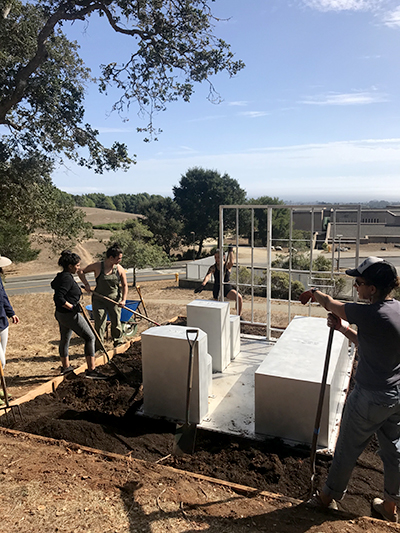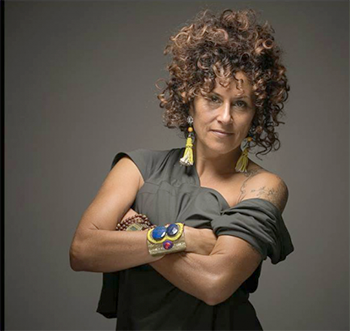Solitary Garden—a public art project created to protest solitary confinement and mass incarceration—will open at UC Santa Cruz with a public reception on November 5 at the Baskin Arts Studios.
Created by New Orleans-based artist Jackie Sumell, the project revolves around a sculpture built by following the blueprint of a standard U.S. solitary confinement cell. This small 6’ x 9’ prison cell will sit on campus atop a slope near the Baskin Art Studios that looks out on Monterey Bay.
Over the next year, a garden of flowers and vegetables will grow around the cell, designed by Tim Young, who is currently incarcerated in San Quentin.
Young will communicate by letters and drawings with students and volunteers who will plant and tend the garden as his proxies. The idea is to transform the image of confinement into a space of nourishment and hope.
“While the United Nations has condemned the practice of solitary confinement as torture, there are an estimated 61,000 people held in isolation for 22 to 24 hours each day in U.S. prisons,” said Sumell. “Solitary Garden is a call to end this appalling practice."
The process of collaboratively nurturing the garden and watching the the plants surround the prison cell offers both participants and viewers the opportunity to, as Sumell puts it, imagine a landscape without prisons.
The opening of Solitary Garden marks the launch of 18-months of programming and exhibitions organized by the Institute of the Arts and Sciences (IAS) called Barring Freedom. With exhibitions, speaking events, film screenings, and a symposium in Fall 2020, Barring Freedom will bring together some of the most important artists, scholars, and activists around the complex issues of policing, surveillance, imprisonment, and detention that bar millions of people from freedom in the United States.
“We are excited to bring Solitary Garden to Santa Cruz because the project intersects with the long history of teaching and activism around mass incarceration, prisons, and solitary confinement on this campus,” noted Rachel Nelson, interim director of the IAS.
“From the abolitionist teaching, research, and activism of Angela Davis, history of consciousness professor emerita, to the studies and legal testimonies of psychology professor Craig Haney about the effects of solitary confinement, this art project is deeply embedded in the concerns of the faculty and students at UC Santa Cruz,” she added.
A multimedia artist and activist, Sumell has exhibited her work throughout the United States and Europe. An ardent public speaker, she has also lectured in colleges and universities around the country and was a keynote speaker for the National Prisoner Advocacy Conference in 2014.
Her art is driven by a deep commitment to addressing the abuses of the American criminal justice system, as exemplified by her 12-year collaborative project with the late Herman Wallace, one of the former Angola 3 prisoners, titled The House That Herman Built. The project is the subject of a critically acclaimed documentary film, Herman's House, that aired on PBS. Sumell began the Solitary Garden project to honor the legacy of Wallace, who was held in solitary confinement for more than 40 years.
__________________________________________________________________________________________
The Solitary Garden public sculpture and garden project will run on campus from Nov. 5, 2019, to Dec. 6, 2020. The opening reception takes place Nov. 5, at the Baskin Arts Studios quad, beginning at 5:30 p.m. Artist Jackie Sumell will also give an artist talk on Nov. 5 at UCSC’s Digital Arts Research Center (108), beginning at 7 p.m. Sumell will be joined by UCSC feminist studies professor Gina Dent in conversation following her talk. Admission is free and open to the public. Visit the Institute of the Arts and Sciences web site for more information.




